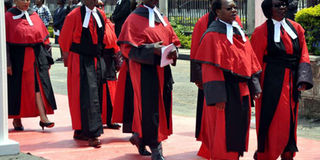We need a public health model to entrench the rule of law

Judges at the Supreme Court. Requiring citizens to be scared of the Judiciary is tantamount to reversing the gains made in governance and taking us back to the days when the Executive was the decider on what was legal. PHOTO | FRANCIS NDERITU | NATION MEDIA GROUP
What you need to know:
- The role of our Judiciary is to interpret the law and the Constitution whenever there is a conflict between individuals or institutions.
- It is curious to see the Executive attacking the Judiciary and accusing it of setting a liberal a tone when dealing with regime opponents.
- The government must empower security forces to be able to fulfil their mandate of preventing crime.
Kenya is a constitutional democracy. Our system of governance, our guarantee of rights and our conflict resolution systems are based on our relatively liberal democratic Constitution.
If one were to find a hierarchy in the scheme of things, it would have the ‘People’, collectively, at the top, speaking through their Constitution to announce their rights to all and to set up other institutions of State.
The People have therefore established a system of representation in order to constantly make laws that facilitate the clearer expression of their will as directed in the Constitution, and they have also created the Executive to implement this will.
They have also set up independent offices to carry out, on their behalf, special functions that cannot be directly entrusted to any other organs of offices of the State.
VOICE
Finally, the People, acknowledging the inevitability of conflict in society, have set up a conflict resolution system, at the apex of which sits the independent Judiciary.
The role of our Judiciary is to interpret the law and the Constitution whenever there is a conflict or misunderstanding between individuals or institutions.
The courts do not make the law, but may in certain cases interpret the law so as to seem to make new law where none exists.
All this must be consistent with the Supreme law — The Constitution— which may rightfully be regarded as the voice of the People, collectively.
It is therefore very curious to see the Executive arm of government spending precious time and resources attacking the Judiciary and accusing it of setting too liberal a tone when dealing with regime opponents.
PEOPLE-FRIENDLY
Government functionaries are using media space to argue about whether the Judiciary should always look over their shoulders at the ‘real world’ (a euphemism for Executive fiat) instead of remaining what the Kenya Government Spokesman calls ‘a Judiciary adversely independent of the Executive’.
The government spokesman, presumably speaking for the government (the Executive), opines that the Judiciary should not be dreaded by the government, but by the (potentially crooked) citizens.
Unfortunately for him and others who think like him, the 2010 Constitution was crafted with the overarching purpose of limiting the damage a rogue government can do to the fabric of the State.
The institutions created were meant to be people-friendly and largely suspicious of officialdom.
CROOKED
Whenever a conflict arises between a holder of public office and a common citizen, adjudicating agencies are required by the Constitution to ensure that the needs of the citizen are first accommodated to the fullest extent of the law, after which the considerations of officialdom would follow.
In the minds of those that midwifed this Constitution, the government, collectively, was meant to be constantly scared of the citizens, and to be subservient to the will of the People.
Requiring a citizen, however crooked, to be scared of the Judiciary, or any other public office, would be tantamount to reversing this express constitutional framework, and taking us back to the dark days when the Executive was the ultimate decider on what was legal and what was not.
SECURITY
Instead of complaining about the liberal nature of Judiciary decisions, the government should go to Parliament with laws to take care of her national security concerns (within Constitutional limits, of course!).
After this, the government should promote respect for law and order by itself operating only within the bounds of the law, and avoiding blatant disregard of the same.
Finally, the government must empower the security forces to be able to fulfil their mandate of preventing crime, stopping it early when it occurs, and effectively prosecuting law-breakers within the confines of the law.
DIAGNOSIS
This is what I would call a Public Health Approach in the development of a truly constitutional democracy.
This is because the approach is grounded on the public health philosophy beginning with health promotion, prevention of disease, early diagnosis and treatment when disease sets in, and rehabilitation of those with chronic disease without immediate cure or with enduring complications.





